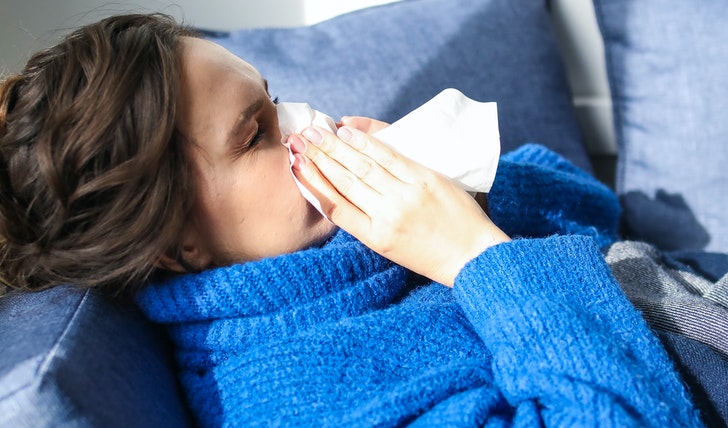
Do You Need Antibiotics to Treat Flu?

Flu season is here. This annoying illness can spread from person to person. Chances are, you might fall victim to the flu. While drinking hot chicken soup and sleeping in warm blankets can make you feel good, they won’t help in the treatment.
What about antibiotics? Should you take any of those to fight the flu? To get the right answer, you first need to know the causes. And how viral infections differ from bacterial ones.

Pixabay / Pexels / Flu is more deadly for children and underage girls, suggests a report.
What Causes Flu?
It’s important to know that flu is a viral infection. The ‘Influenza Virus causes it.’ This virus causes seasonal epidemics each year. Medically speaking, antibiotics don’t help with viral infections. They are only effective against infections caused by bacteria. However, how viruses infect your body is different from bacteria. Viruses infect your living cells. They grow and reproduce inside them.
Since the influenza virus also hides inside your cells, treating the flu with antibiotics isn’t the right approach. You have to combat a virus, not a bacteria. And you can do so by taking antiviral drugs.

Polina / Pexels / According to The World Health Organization (WHO), poor lifestyle and bad weather are the major flu causes.
What if I Take Antibiotics?
The use of antibiotics can do harm to your health. They kill both good and bad bacteria. Overuse of antibiotics can lead to diarrhea, abdominal pain, and yeast infections. The fewer antibiotics you take, the better it is for your health. So you have to consult your doctor before taking them. On the other hand, in case of flu, never use them. They won’t treat your running nose, ever.
Here’s How You Can Treat Flu
If antibiotics aren’t helpful, what’s the treatment for the flu then? Though viruses are strange, their treatment isn’t. They are ‘self-limiting’; they’ll vanish with or without treatment.
You can take antiviral drugs to treat the flu faster and prevent serious complications. You can take them as soon as you notice flu symptoms. Some of them are:
- Baloxavir Marboxil
- Zanamivir
- Oseltamivir Phosphate
- Peramivir
Besides, you can try several home remedies. The most effective one is taking a good rest. Getting enough sleep can boost your immune system. Doctors argue that the immune system is the natural fighter of our body against diseases. Using menthol ointment, taking a hot bath, and chicken soup are also helpful in the recovery process.

Mojca / Pexels / Nonchemical drugs and natural medicines are the best flu treatment, says WHO.
Likewise, you should also drink plenty of fluids like water, herbal tea, broth, and juices. They keep you hydrated and help you relieve the symptoms. If your symptoms are not getting better even after ten days, you’ll need to talk to your doctor.
Nevertheless, complications can prolong or worsen for people at higher risk. In that case, you must consult a doctor before taking any further medications. The high-risk groups include:
- Young children
- Adults of 65 years or older age
- Children with neurological conditions
- Pregnant women
- People with severe medical conditions like diabetes, asthma, heart diseases, stroke, etc
How to Prevent Flu?
You can prevent the flu by getting vaccinated each year. These jabs will make sure your illness doesn’t get severe. Some other ways to avoid flu are:
- Covering your nose and mouth while coughing or sneezing
- Avoiding contact with sick people
- Washing hands regularly with antibacterial soaps
- Disinfecting surfaces and objects that you frequently touch
More inHealthy Trends
-
`
Are Popular Diet Trends Actually Good for Your Heart?
Diet trends grab headlines every year, promising everything from glowing skin to dramatic weight loss. But when it comes to the...
July 30, 2025 -
`
Why Are Men Taller Than Women? New Genetic Study Finds Clue
For centuries, the average height difference between men and women has been noticeable—men generally stand about five inches taller. While environment...
July 23, 2025 -
`
How Upcycled Beauty Ingredients Are Reshaping the Industry’s Future
The beauty industry is going through a big shift — and it’s not just about trends. As waste problems grow and...
July 17, 2025 -
`
A Look Inside Faith Kipyegon’s Groundbreaking Mile Run in Paris
Last week in Paris, Faith Kipyegon returned to a place she knows well: Stade Sébastien Charléty. But this time, she wasn’t...
July 9, 2025 -
`
Dairy Is Making a Major Comeback — And Health Shoppers Are Loving It
Just a few years ago, dairy sat quietly in the back seat while plant-based alternatives took the spotlight. Now, it’s stepping...
July 4, 2025 -
`
Does Aging Cause Dental Problems?
Aging doesn’t automatically mean losing teeth or developing gum disease. In fact, older adults today are holding onto more of their...
June 25, 2025 -
`
How Upcycled Ingredients Are Shaping the Future of Cosmetics
What used to end up in bins or compost heaps is now finding a new life inside skincare bottles and beauty...
June 18, 2025 -
`
Rock Legend Rod Stewart Trains to Break Sprint Record at 80
Age isn’t slowing Rod Stewart down. Known worldwide for his legendary voice, stadium-filling tours, and timeless hits like “Maggie May”, the...
June 11, 2025 -
`
The Truth Behind Detox Diets – Health Boost or Risky Trend?
It’s hard to scroll through your feed without seeing someone sipping green juice with promises of instant energy, glowing skin, and...
June 3, 2025














You must be logged in to post a comment Login